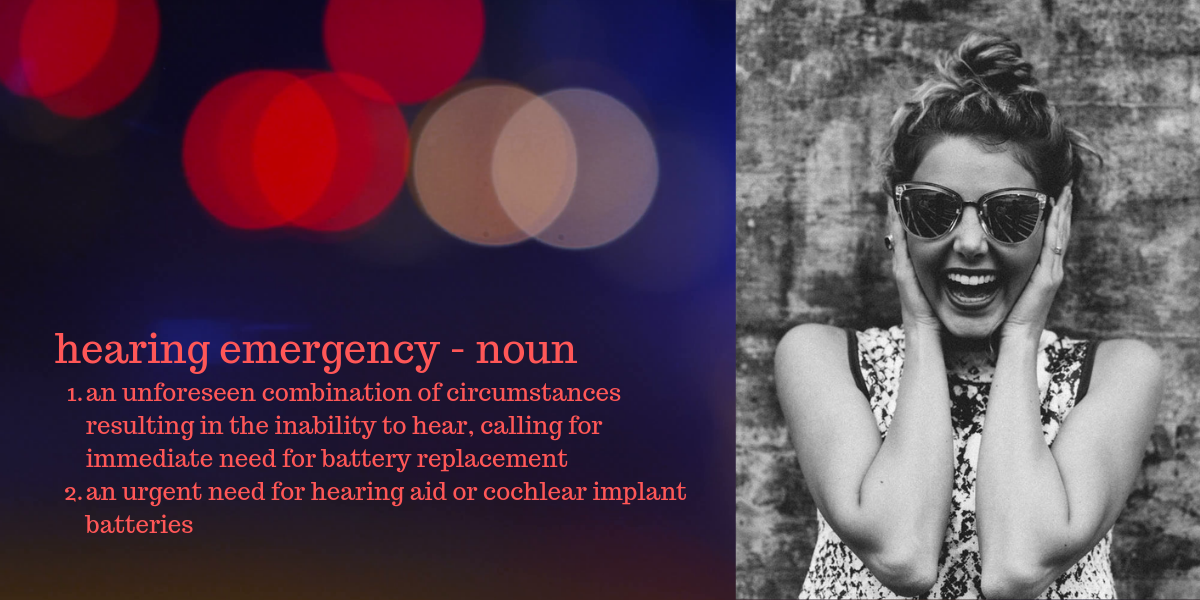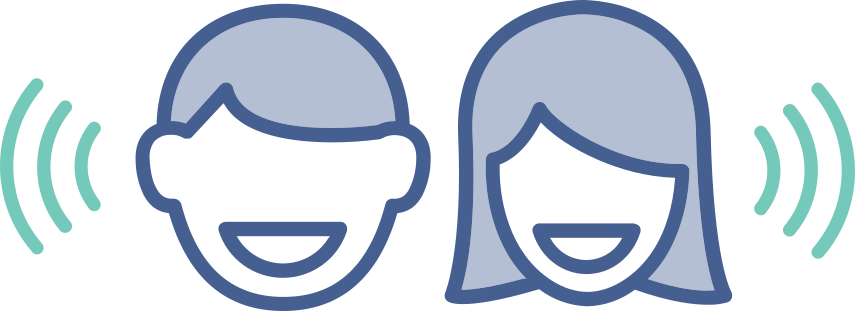A few years ago at the University of Wisconsin, chemistry student Ashley McGoey was sitting in her organic chemistry lecture for the big review before a final exam. Her entire lecture was in attendance, anticipating a tough final coming up. Everyone was focused on the review, fiendishly taking notes, while Ashley had something happen to her that no other student in her lecture would encounter. Her hearing aid began to beep, indicating that it was running low on batteries. With another 45 minutes left in the lecture, Ashley began to panic. She knew it was only a matter of time until her hearing aid would run out of batteries completely, making it almost impossible to take in all of the information that the rest of her classmates were absorbing. Her batteries finally ran out, forcing her to scramble out of class and sprint to the nearest drug store on campus. While she was momentarily relieved to be able to hear again, stress overtook again as she realized she was now going to be late to her next class even if she rushed.
Luckily, Ashley was able to get notes from some her classmates, but this kind of panic and running around should be the last thing a busy college student should have to worry about.
Don’t Wait Until It’s Too Late
Unfortunately, many people tend to forget how low they are on their hearing aid battery supply until it is too late. It’s similar to when the batteries run out in your remote control. All of a sudden you are put into a situation you weren’t prepared for, except with consequences a lot more severe than not being able to change the channel. This is your gateway to being able to hear the world around you and interact with society, and if you aren’t prepared with spare batteries, you unfortunately are put into a dire situation.
These gaps in hearing, which are being called “hearing emergencies,” are a situation that is all too common and can be a detriment to one’s health as well as one’s well-being and quality of life.
There have been a number of studies published recently linking untreated hearing loss to a number of ailments, including depression, dementia, an increase in falls, and even cardiovascular disease (1). Not having a functioning hearing aid, or one that doesn’t have batteries, is not actively treating your hearing loss, so it’s more important than ever to make sure you have batteries on hand.
While Ashley’s hearing emergency could be remedied in a relatively short period of time, there are people across the country who aren’t able to run to the nearest drug store when their hearing aid batteries run out.
Hearing aid user Tracy Pribbeno, who lives in Imperial, Nebraska, talks about what she would go through before she enrolled in a subscription-based program that provides hearing aid batteries in the mail to her every month.
“I live in a pretty rural part of the country, which I enjoy,” Tracy says. “The problem though was that the closest place that sold hearing aid batteries was around 50 or 55 miles away.” When Tracy encountered a situation where she didn’t realize her battery supply had been depleted, she would have to drive close to an hour in silence to get new batteries. That hour of silence could be a lot longer if she wasn’t prepared to go to the store right there and then. Many times people who are in this situation have to wait until the next time it is convenient, which could be a day or two later, to go buy their batteries. This silent period causes an unfortunate period of isolation when it is difficult to interact with the world around you.
Buying In Bulk
What Tracy would do before she enrolled in a delivery service was buy batteries in bulk and keep a large quantity in her closet. Although this led to less-frequent hearing emergencies, she also noticed that the quality and life of her batteries would diminish by the time she got to the end of her supply. She had no idea how long the batteries were sitting on the shelf before she bought them, and then they would sit for another 6-8 months in her closet while time was ticking away.
“When you buy hearing aid batteries in bulk, they are not fresh,” Tracy says. “I would buy a lot so I wouldn’t run out, but when I would get to the end of my supply they were really old and would not last.” Her fresh supply of batteries that are delivered to her in the mail last a lot longer than the supply she would keep in her closet for months at a time.
Luckily, Tracy is mobile and is able to drive, albeit a long distance, to find batteries when she would run out. There are many Americans, particularly senior citizens, who run into a hearing emergency when their batteries run out and aren’t able to purchase batteries for themselves.
“Routt County is a rural part of Colorado, so our seniors who don’t drive depend on our transportation service to get around town,” said Meg Tully, Executive Director of Routt County Council on Aging based in Steamboat Springs, CO. “We take them to doctor’s appointments, the bank, post office, shopping and other places they need to go. But our service is only offered certain days of the week during day-time hours. If a client runs out of hearing aid batteries at night, they’d have to wait until the next time we can pick them up to purchase new batteries. This delay can be dangerous if a senior needs help, and it also can lead to a period of unnecessary frustration.”
Elder Communities
There are many senior living centers across the United States where this problem occurs as well. Most of the seniors rely on family members to pick up batteries and drop them off. Unfortunately, most people cannot drop what they are doing at a moment’s notice when their loved one runs out of batteries.
“We did a focus group at an Elder community in Chicago and met a woman who would go as long as 2 weeks without being able to hear, and she would wait on her kids to drop off batteries on their monthly visit,” explains Bob Pole, the co-founder of hearing aid battery subscription service hearOclub. “The more and more Elder communities we would talk to, the more we learned that this was a trend, and the more concerned we grew.”
Bob learned that when people would run out of batteries in senior living communities, they would become reclusive and despondent. While waiting for their family to drop off their batteries, they would sit in their rooms instead of socializing or participating in activities – their life would come to a halt.
Bob says: “We started hearOclub as a way to help people who didn’t have a way to get a supply of batteries for themselves when they would run out. We thought this would help people become more engaging socially and would end these hearing gaps. What we’ve learned is that these gaps, or hearing emergencies, have a major impact on peoples lives beyond being able to socialize. What we’ve learned is that a lot of ailments that Elders are experiencing, from dementia to frequent falls, are accelerated by not having their hearing loss treated. By not having a scheduled shipment of hearing aid batteries, many of these Elders are putting themselves in danger and at risk with other ailments.”
Refilling the “Prescription”
Dr. Brian Harrington, MD, MPH, compares the need for consistent hearing aid batteries to other drugs that people need on a consistent basis. “Some of my patients rely on alarms to remind them when to take pills or if their blood sugar is low,” Dr. Harrington says. “Temporary hearing loss puts such patients at risk for adverse health outcomes.” He also notes how social engagement is very important for mental health and maintaining cognitive function. “The Blue Zones concepts emphasize that social engagement is one of the key traits of people who live long and well, and uninterrupted hearing is vital for social engagement,” Dr. Harrington adds. ” I know many patients who avoided social interaction because they could not hear well.”
“If you have untreated hearing loss (within the senior community), you have twice the risk of falling, and three times the risk of developing dementia,” says Benjamin Surmi, Social Gerontologist, Director of People and Culture at Koelsch Communities. “Everything we are doing to prevent these falls, what’s the point if we aren’t starting with addressing a solution to their hearing loss? It’s a top priority.”
One thing people can do aside from signing up for a delivery service like hearOclub is to always keep spares on hand. There are many portable devices that work for storage. It can be best to keep a storage compartment on something that you always have on your person to begin with. This can be a separate compartment in your purse, or even a keychain that can hold spare batteries.
Many people, including hearOclub member Barbara Norman, keep a battery testing keychain on them at all times so they can test the charge of her battery, as well as always know they have a spare on hand.
“My keychain is really handy,” Barbara says. “The other day I was at the doctor’s office when I heard the low-battery chime go off on my hearing aid. I knew I wouldn’t be home before it died, but luckily I had a spare in my keychain. It saved the day!”
Last week Ashley McGoey, now a scientist at a pharmaceutical testing company in Wisconsin, was running through campus again. This time it wasn’t to find hearing aid batteries, it was while she was running a 5K race to train for a marathon she’s participating in this fall.
“The 5k involved literally running around campus, but this time for a good reason! Obviously when you’re running, you can’t carry all of your things with you, so I got a belt with zippers to put some of the important things in, like my hearing aids and my keys,” Ashley says. “Usually I keep extra hearing aid batteries in my bag, and I was worried about risking not having extra batteries for the rest of the day when we were meeting up with friends. Luckily, I had my hearOclub keychain that I could store the batteries in and zip up in my belt with my keys. Then I had nothing to stress about and I could fully enjoy my first race plus celebrating afterwards!”
Whether it’s being proactive and making sure that you have a hearing aid battery supply at all times, or relying on a delivery service so you never run out, you can ensure that you avoid periods when you can’t hear. It’s become more important than ever – and easier than ever – to stop hearing emergencies from negatively affecting your life.
Click here to never run out of hearing aid or cochlear implant batteries again: https://www.hearoclub.com/subscribe
Learn more about the best hearing aid batteries for you: https://www.hearoclub.com/2019/04/04/the-best-hearing-aid-batteries-for-you/
1 – https://www.nytimes.com/2018/12/31/well/live/hearing-loss-threatens-mind-life-and-limb.html



